Decades after my junior year in Paris and Tours, I decided to spend my vacations discovering France.
From the mid-1990s to the present, I visited about 100 villages and towns throughout the Hexagon: from Arras to Avignon, from La Rochelle to Colmar. Images include breathtaking landscapes (St-Cirque_Lapopie), atop a cliff overlooking the Lot Valley, magnificent architecture (Hôtel de Ville-Paris), and grand public spaces (Luxembourg Garden). I got to visit the City of Light dozens of times, discovering new corners and revisiting favorites.
My most memorable trips though were several I made to Northern France to research my father’s early life. Born in Western Massachusetts in 1902, my father was an honest, quiet man who did not talk a lot and rarely spoke of his past. He passed away at age 66, during my senior year in college, soon after I returned from my junior year in France.
While I was fortunate to witness my mother’s life through her 99th year, I knew little about my father. So, from 2004-2006, I set my itineraries on those spots in “Le Nord” my father had lived in during his twenties: towns such as Beuvrages, Auby and Raismes - not your typical tourist towns. The internet was in its nascent phase, and a few inquiries I sent went unanswered. Armed then with only the personnel papers from several factories from the 1920s that my mother had saved, I set forth on a series of solo trips that became a personal pilgrimage.
In Beuvrages, with a population of 6,700, I searched for the enamel factory (“l’Émaillerie Drouin”) where my father had worked in the 1920s. I stopped for lunch at a restaurant by a rotary and chatted with its congenial owner/barman. Pointing to a grassy field across the street, Jean-Marc exclaimed, “Oh, l’émaillerie! My grandfather and everyone’s grandfather worked there!!”
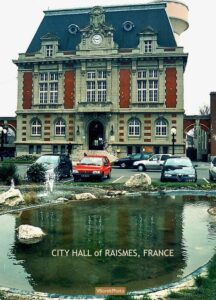 While searching for my father’s address in the neighboring town of Raismes, several locals offered crucial information. Régine, a city administrator recommended by Jean-Marc, showed me a detailed municipal map. It revealed that the street name listed on my father’s personnel file had been changed to “rue d’Anatole France.” Minutes later, I was driving my Peugeot down the newly renamed road when I noticed an elderly man walking alone. I parked and approached him to explain my mission. The gentleman used his cane to point at two sets of numbers on the door of his house across the street—indicating that the house numbers had also been changed. My father’s home could very well be one of the three brick cottages located right there. A bit farther up the street, near a rotary, stood a few more houses with higher numbers.
While searching for my father’s address in the neighboring town of Raismes, several locals offered crucial information. Régine, a city administrator recommended by Jean-Marc, showed me a detailed municipal map. It revealed that the street name listed on my father’s personnel file had been changed to “rue d’Anatole France.” Minutes later, I was driving my Peugeot down the newly renamed road when I noticed an elderly man walking alone. I parked and approached him to explain my mission. The gentleman used his cane to point at two sets of numbers on the door of his house across the street—indicating that the house numbers had also been changed. My father’s home could very well be one of the three brick cottages located right there. A bit farther up the street, near a rotary, stood a few more houses with higher numbers.
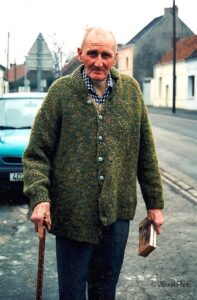 Minutes later, continuing up the road, I noticed a sign, “Recreation Center,” and I again stopped. Although it was nearly five o’clock, Patrick, the administrator, enthusiastically informed me that houses past the rotary were constructed years after the older brick ones I’d just passed. Therefore, my father’s home was certainly one of the cottages up the road, where “le monsieur” and I chatted.
Minutes later, continuing up the road, I noticed a sign, “Recreation Center,” and I again stopped. Although it was nearly five o’clock, Patrick, the administrator, enthusiastically informed me that houses past the rotary were constructed years after the older brick ones I’d just passed. Therefore, my father’s home was certainly one of the cottages up the road, where “le monsieur” and I chatted.
Another major discovery site of my father’s past was Auby, near Douai, a longtime center of international zinc production. The Compagnie Royale Asturienne Des Mines, founded by a Belgian, Jules Hauzer, in 1853, would later produce zinc for roofs and building structures across Haussmann’s redesigned Paris.
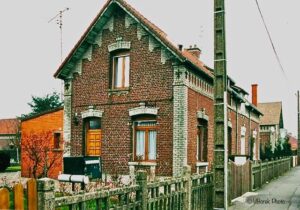 In a garage-like building next to the former town hall, I met with Auby archivist, Jean-Paul Marlaire. The affable historian had just published a book on Auby that included my father’s era. He showed me a photograph of men standing, washing themselves at a long sink, and suggested that my father most likely used that washroom and lived in the building for “célibataires.” In his designs the visionary Hauzer had included a “workers’ city” with living quarters for both single and married men of different nationalities.
In a garage-like building next to the former town hall, I met with Auby archivist, Jean-Paul Marlaire. The affable historian had just published a book on Auby that included my father’s era. He showed me a photograph of men standing, washing themselves at a long sink, and suggested that my father most likely used that washroom and lived in the building for “célibataires.” In his designs the visionary Hauzer had included a “workers’ city” with living quarters for both single and married men of different nationalities.
Later that (Friday!) afternoon at the zinc factory, a dual-function, personnel/safety manager named Eric gave me a tour of the facility—past a glowing 800-degree oven; sensuous, silver rolls of zinc—still hot-to-the-touch; and chest-high models of zinc roofs, like many seen over Paris. I could now imagine my father inside this space, working in the production of an important metal.
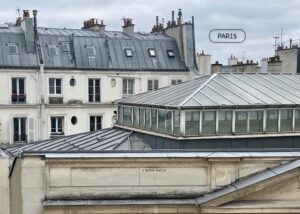 Through the years, the factory changed names and focus several times and continues to thrive in various, expanded fields of metallurgy. The workers’ homes still exist, privatized in the 1980s.
Through the years, the factory changed names and focus several times and continues to thrive in various, expanded fields of metallurgy. The workers’ homes still exist, privatized in the 1980s.
Walking on the very land, inside and past the same buildings my father did, and having animated conversations with French men and women, I created an amazing experience for me.
Concrete images and information on my father’s life replaced the void. I now have a setting—a sense of place and time that is both decades ago and today, whenever I remember my father, Joseph Borek.
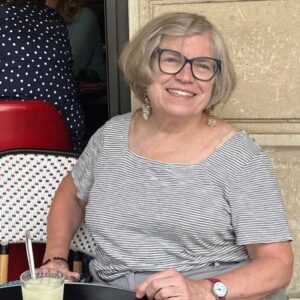 Vivian Borek, longtime member of the French Library, has made dozens of solo ‘discovery' trips to Paris and 100 towns throughout the Hexagone since the 1990s. She now shares her adventures and photography in travel presentations, live and on Zoom. The combination of travel and educational programs at the French Library, said Vivian, both helped improve her language skills and enhance her experiences.
Vivian Borek, longtime member of the French Library, has made dozens of solo ‘discovery' trips to Paris and 100 towns throughout the Hexagone since the 1990s. She now shares her adventures and photography in travel presentations, live and on Zoom. The combination of travel and educational programs at the French Library, said Vivian, both helped improve her language skills and enhance her experiences.
The Worcester, Mass. native began her love of French in the seventh grade, then realized her dream of studying in France with the Rutgers University Study Abroad Program in Paris and Tours. She received a BA in French at Marietta College and an MA from the University of Chicago.
An award-winning, former editor at Boston University, Vivian is now completing an illustrated, abridged version of her mother’s diary, created in a Rhode Island mill town prior to World War II.
All images courtesy of the author.

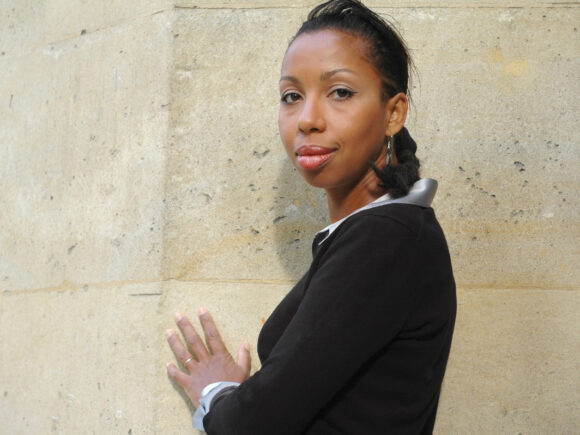




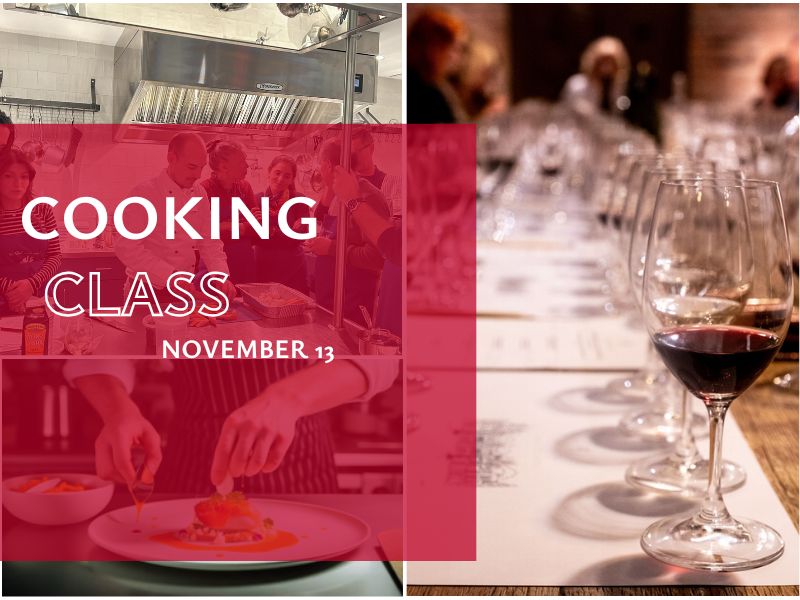
Hi, Vivian,
I enjoyed reading about your visit to towns in northern France where your father lived in his twenties. Your serendipitous encounters and more or less success make for the best kind of adventure! And, even better, when you think of your father now, some former voids are now overlaid with colorful memories!
Deborah
What a wonderfully detailed view of a personal quest for meaning and connection by way of a customized itinerary through the Heart of France. Simultaneously intimate and universal it is everything a travelogue should aspire to be! Merci beaucoup Mme. Borek!
Very interesting and meaningful travel and it reveals so much about your unique family history. Congrats for searching out new meaning in your travels to France!